We all have a picture before our eyes: a cat and a fish, a cat and milk. This image looks so harmonious and cute. There is a legend that a wild cat liked the milk so much that it wanted to stay and live near a person. To avoid straining herself with the extraction of this valuable resource. But may cats drink cow milk?
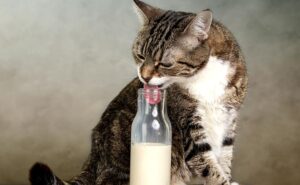
But in reality, can kittens, and even more so adult cats, have milk? If you have a cat living in your house, you probably notice that the animal experiences intestinal upset after drinking milk. And it doesn’t happen every time: sometimes everything is fine, and sometimes – uh…
Let’s look at this challenging issue.
Can kittens be given milk: a rhetorical question. But may cats drink cow milk?
A mother cat feeds her cubs for at least 1.5-2 months. Cat milk contains all the nutrients that help little tails increase and increase immunity.
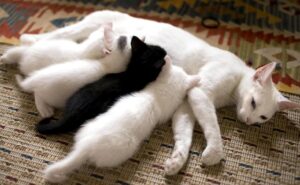
Milk composition:
- Fatty acid
- Enzymes
- Casein
- Lactose
- Low molecular weight protein
- Amino acids
- Minerals
- Vitamins
No animal organism can develop, grow, or typically exist without this element. Milk is a building material for kittens. In babies up to three months old, the body produces lactase, an enzyme that breaks down milk sugar.
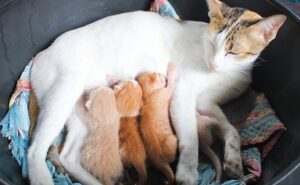
Often, a kitten comes to its owner when it is too young. In this case, he needs to be provided with adequate nutrition, and milk is the most crucial point.
Until what age do kittens drink their mother’s milk?
If you didn’t know, cats don’t produce milk right away. First, more liquid colostrum is released, which gives the cubs the necessary substances to gain immunity.
It’s hard to say how often kittens drink milk daily since both mother and children live according to their schedule, which suits only them. But on average, kittens eat up to 12 times in the first week. And this needs to be considered if you have a tiny lump in the house. In the first weeks, a delay in feeding is dangerous for the baby’s life.
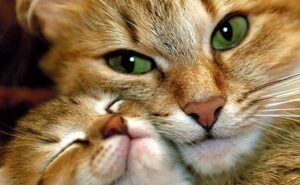
Further, the feeding frequency gradually decreases, and children eat six times a day by the end of the first month.
Again, it is only possible to say what age a cat feeds kittens with milk. Everything is very individual.
The duration of feeding depends on:
- Completeness of the mother’s diet. The cat needs more nutrition during lactation, as it eats for the entire “family.” Moreover, the menu must be balanced so that the litter receives all the necessary elements.
- The health and morale of the cat. During childbirth, the animal may receive psychological trauma and not recognize the cubs. Also, the mother’s nipples may be very sensitive, and then feeding will not last long.
- Number of “heirs” A cat has six nipples. Therefore, they can fully feed only six kittens. If there are more “people,” then the slowest and weakest kittens risk, if not dying of hunger, then significantly less than usual. Moreover, the more kittens, the sooner the cat closes its “dairy kitchen.”
On average, kittens are content with milk until about 2-2.5 months. But, as already mentioned, the deadlines can be either extended or shortened.
What kind of milk to feed kittens: babies left without a mother
It’s sad, but such cases are far from rare – kittens are left without a cat. Or you got a kitten of milk age. How to put him on his paws? What kind of milk should I feed newborn kittens without a cat?
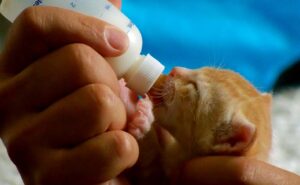
Let’s start with the fact that it is undesirable to give cow’s milk to babies. It is intended for feeding herbivorous calves but not for predators, which cats are.
Babies poorly absorb Burenka milk, and even more so, the store-bought version is unsuitable for them. Such a product may contain something that should not enter the toddler’s stomach:
- Pesticides
- Vegetable oils
- Antibiotics
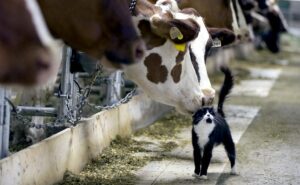
But natural goat milk is quite suitable. It only needs to be diluted a little with boiled water because it is higher in fat content than cat milk. The lactose content in it is less than that of cow milk, and its composition is similar to that of breast milk.
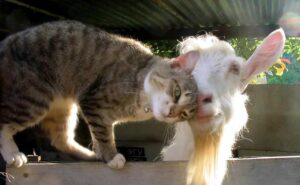
You can buy an industrial substitute at a pet store; baby food for human “cubs” will do.
And yet, can cats have milk?
Veterinarians advise excluding milk from the diet of grown kittens from about six months of age. The kitten grows up and begins to digest milk sugar worse. The result may be vomiting, diarrhea, and bloating.
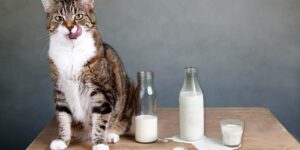
But as always, there are exceptions to the rule. It happens that a cat calmly, without any consequences for its health, drinks milk. My friend’s cat sits tightly on cream and has a specific fat content and freshness. And at least henna.
In this case, experts note that almost all cats like the taste of milk, but it does not benefit their bodies.
And why can’t cats drink milk? One reason: it’s high in calories. And if a kitten is a growing creature that consumes a lot of energy, then an adult cat can “overdo it” with calories and become a lump.
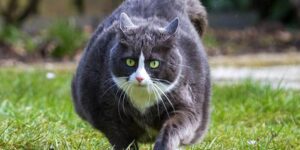
Please switch your pet to products such as kefir, fermented baked milk, and unsweetened yogurt. They do not contain milk sugar and are rich in bacteria that benefit intestinal flora. The fat content of treats should be low.
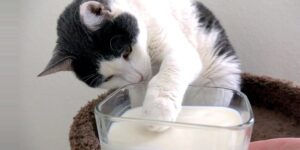
But if your cat absorbs regular milk without any visible problems, she digests lactose well. This, by the way, is common among people. Well, let the little one enjoy it!
Video: Is it possible to give cats milk – advice from a veterinarian




